
Quicksilver Messenger Service is an American psychedelic rock band formed in 1965 in San Francisco. The band achieved wide popularity in the San Francisco Bay Area and, through their recordings, with psychedelic rock enthusiasts around the globe, and several of their albums ranked in the Top 30 of the Billboard Pop charts. They were part of the new wave of album-oriented bands, achieving renown and popularity despite a lack of success with their singles. Though not as commercially successful as contemporaries Jefferson Airplane and the Grateful Dead, Quicksilver was integral to the beginnings of their genre. With their jazz and classical influences and a strong folk background, the band attempted to create an individual, innovative sound. Music historian Colin Larkin wrote: "Of all the bands that came out of the San Francisco area during the late '60s, Quicksilver typified most of the style, attitude and sound of that era."

Chester William Powers, Jr. was an American singer-songwriter, and under the stage names Dino Valenti or Dino Valente, one of the lead singers of the rock group Quicksilver Messenger Service. As a songwriter, he was known as Jesse Oris Farrow. He is best known for having written the quintessential 1960s love-and-peace anthem "Get Together", and for writing and singing on Quicksilver Messenger Service's two best-known songs, "Fresh Air" and "What About Me?"

Happy Trails is the second album of the American band Quicksilver Messenger Service. Most of the album was recorded from two performances at the Fillmore East and Fillmore West, although it is not clear which parts were recorded at which Fillmore. The record was released by Capitol Records in 1969 in stereo.

Gary Duncan was an American guitarist, singer and songwriter. He was guitarist with The Brogues, then most notably with Quicksilver Messenger Service, where the complex interplay between himself and fellow-guitarist John Cipollina did much to define the unique sound of that San Francisco based band.

Quicksilver Messenger Service is the debut studio album of Quicksilver Messenger Service, released in May 1968. The group were among the last of the original major San Francisco bands to secure a recording contract, which meant that the album appeared many months after the debut efforts of Jefferson Airplane, Grateful Dead, Country Joe and the Fish, Moby Grape, and Big Brother and the Holding Company. Despite this, the album received acclaim and is considered a cornerstone release in the late '60s Haight discography.
Jim Murray was a guitarist and harmonica player for the psychedelic blues rock band Quicksilver Messenger Service. He also handled lead and background vocals on some songs. He left the band in late 1967 shortly before they recorded their first album.
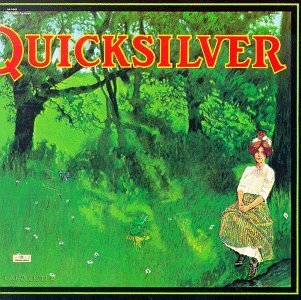
Shady Grove is a 1969 studio album by Quicksilver Messenger Service.

Hillbilly Deluxe is the ninth studio album by American country music duo Brooks & Dunn, released in 2005 on Arista Nashville. Certified Platinum in the United States by the RIAA, the album produced four singles on the Billboard Hot Country Songs charts. The duo produced the majority of the album with Tony Brown.

Greatest Hits is a 1997 compilation album from American country music artist Pam Tillis. The album reached #6 on the Billboard country albums charts. It chronicles her greatest hits from her first four albums for Arista Nashville. The tracks "Land of the Living" and "All the Good Ones Are Gone" are new to this compilation. Both were released as singles, reaching Top Five on the Hot Country Songs charts in 1997. The album was certified Platinum by the Recording Industry Association of America (RIAA) for shipments of over 1,000,000 copies in the U.S. This was the last of her albums to receive certification in sales. "Land of the Living" would also be Pam's last top 10 appearance in the Country Singles Charts.

Just for Love is the fourth album by American psychedelic rock band Quicksilver Messenger Service. Released in August 1970, it marks the culmination of a transition from the extended, blues- and jazz-inspired improvisations of their first two albums to a more traditional rock sound. Founding member Dino Valenti, who returned to the band after a stint in prison on drug charges, was largely responsible for the new sound. Valenti's influence is readily apparent throughout; he composed eight of the album's nine tracks under the pen name Jesse Oris Farrow. Despite the marked change in the band's sound, it was their third straight album to reach the Top 30 on the Billboard charts, peaking at number 27. The only single culled from the album, "Fresh Air", became the band's biggest hit, reaching number 49.

What About Me is the fifth album by American psychedelic rock band Quicksilver Messenger Service. Released in December 1970 and recorded partly at the same sessions that produced Just for Love, the album is the last to feature pianist Nicky Hopkins and the last pre-reunion effort to feature founding members David Freiberg and John Cipollina. Several tracks, including "Baby Baby", "Subway" and "Long Haired Lady" had been played regularly at shows through 1970, previewing the album.
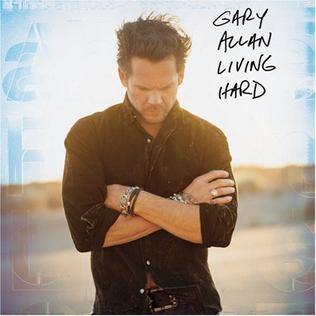
Living Hard is the seventh studio album by American country music singer Gary Allan. It was released on October 23, 2007 via MCA Nashville.
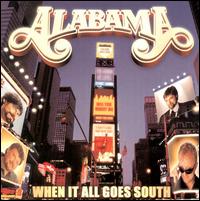
When It All Goes South is the nineteenth studio album by American country music band Alabama, released in 2001. It produced the singles "When It All Goes South", "Will You Marry Me" and "The Woman He Loves". This became Alabama's final studio album of original materials until 2015's Southern Drawl. It ranked at No. 37 in Billboard Album Charts and No. 4 on Country Album Chart.

Comin' Thru is the seventh album by American psychedelic rock band Quicksilver Messenger Service. The album is marked by the debut of a horn section, while Chuck Steaks replaced Mark Naftalin on keyboards. Dino Valenti's songs dominate as they had on the last three albums, with his tune "Mojo" having appeared in their live setlist since 1970. It is generally regarded as their weakest effort, failing to chart higher than #134 and more or less marked the end of Quicksilver as anything other than a part-time band.

Solid Silver is the eighth album by American psychedelic rock band Quicksilver Messenger Service and their mid-1970s comeback album, reuniting the band's entire core lineup.

At The Kabuki Theatre is a live album by American psychedelic rock band Quicksilver Messenger Service. The last four tracks are taken from studio rehearsal tapes, probably made in 1970 and not in 1969 which is stated on the album cover.
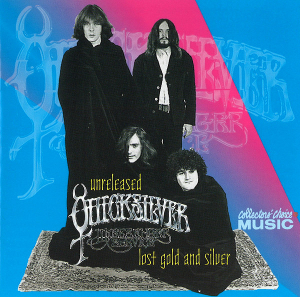
Unreleased Quicksilver Messenger Service — Lost Gold and Silver is a compilation album by American psychedelic rock band Quicksilver Messenger Service. The album is made up of the European 2-LP release Maiden of the Cancer Moon from 1983, two tracks from the 1967 soundtrack album Revolution, both sides from a non-LP single released in late 1968 and some studio outtakes from the late 1960s.
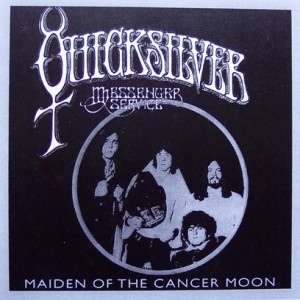
Maiden of the Cancer Moon is a live album by American psychedelic rock band Quicksilver Messenger Service.

David Freiberg is an American musician best known for contributing vocals, keyboards, electric bass, rhythm guitar, viola and percussion as a member of Quicksilver Messenger Service, Jefferson Airplane, and Jefferson Starship. Among other tracks, he co-wrote "Jane", a hit for Jefferson Starship.
"Fresh Air" is a 1970 song written by Gary Duncan with lyrics by Jesse Oris Farrow, the pen name of Chester William "Chet" Powers, Jr., who also used the stage name of Dino Valenti. It was first recorded by the San Francisco-based band Quicksilver Messenger Service, which Valenti had recently rejoined at the start of 1970. "Fresh Air" was the only single released from the album Just for Love. The single peaked at No. 49 on November 7, 1970 during a nine-week stay on the Billboard Hot 100, making it the band's most successful single.


















